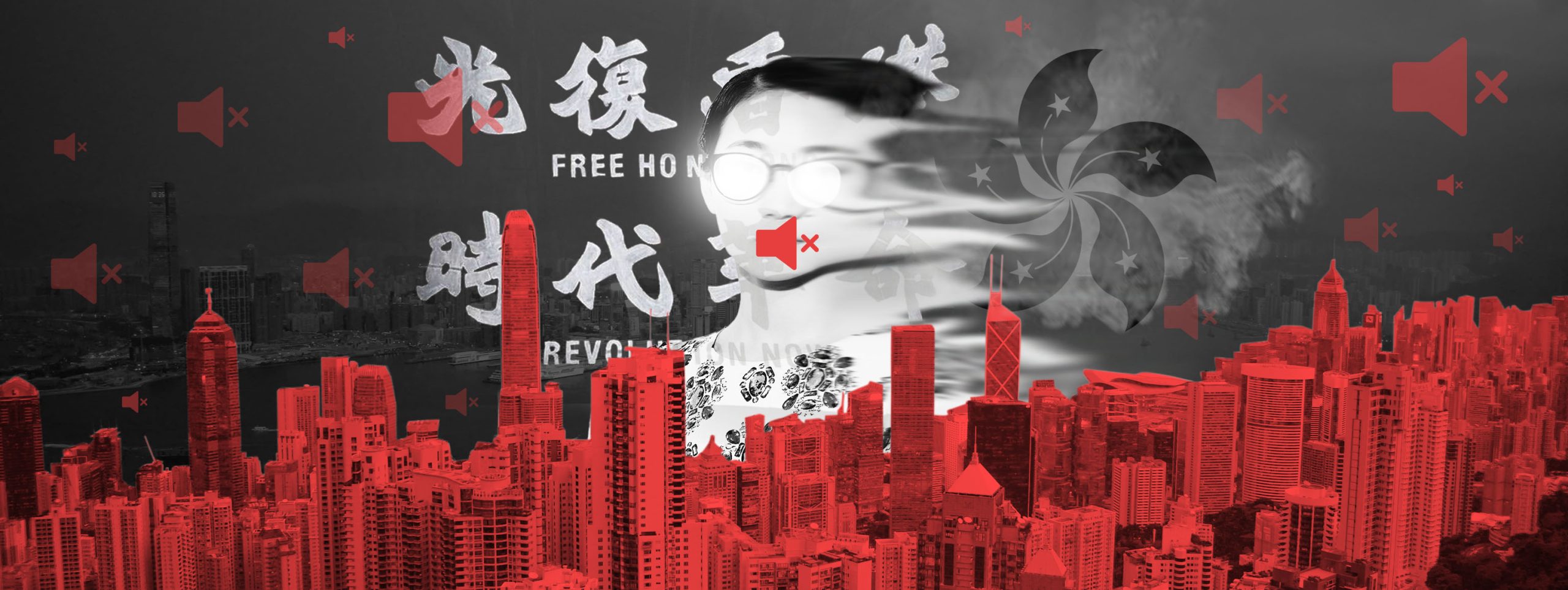|
Getting your Trinity Audio player ready...
|
In March this year, a group of Hong Kong residents participated in a protest against a land reclamation project and garbage processing facility. But the atmosphere was starkly different from that of previous demonstrations in Hong Kong.
All 80 participants were required to wear numbered lanyards. They walked with a security ribbon while police officers filmed the protest with handheld cameras. Many Hong Kong residents continue to wear masks in public places for health reasons, but the protesters were prohibited from doing so under the anti-mask ban imposed by the government with emergency powers during the Anti-Extradition Law Amendment Bill Protest in 2019. The ban remains in effect despite the absence of violent protests over the past three years.
Per police request, the organizers repeatedly reminded journalists to maintain distance from the participants. They had also been instructed to ensure that the protesters did not exceed 100 people. In addition, the police had pre-checked their banners and placards to ensure there were no “sedition words.”
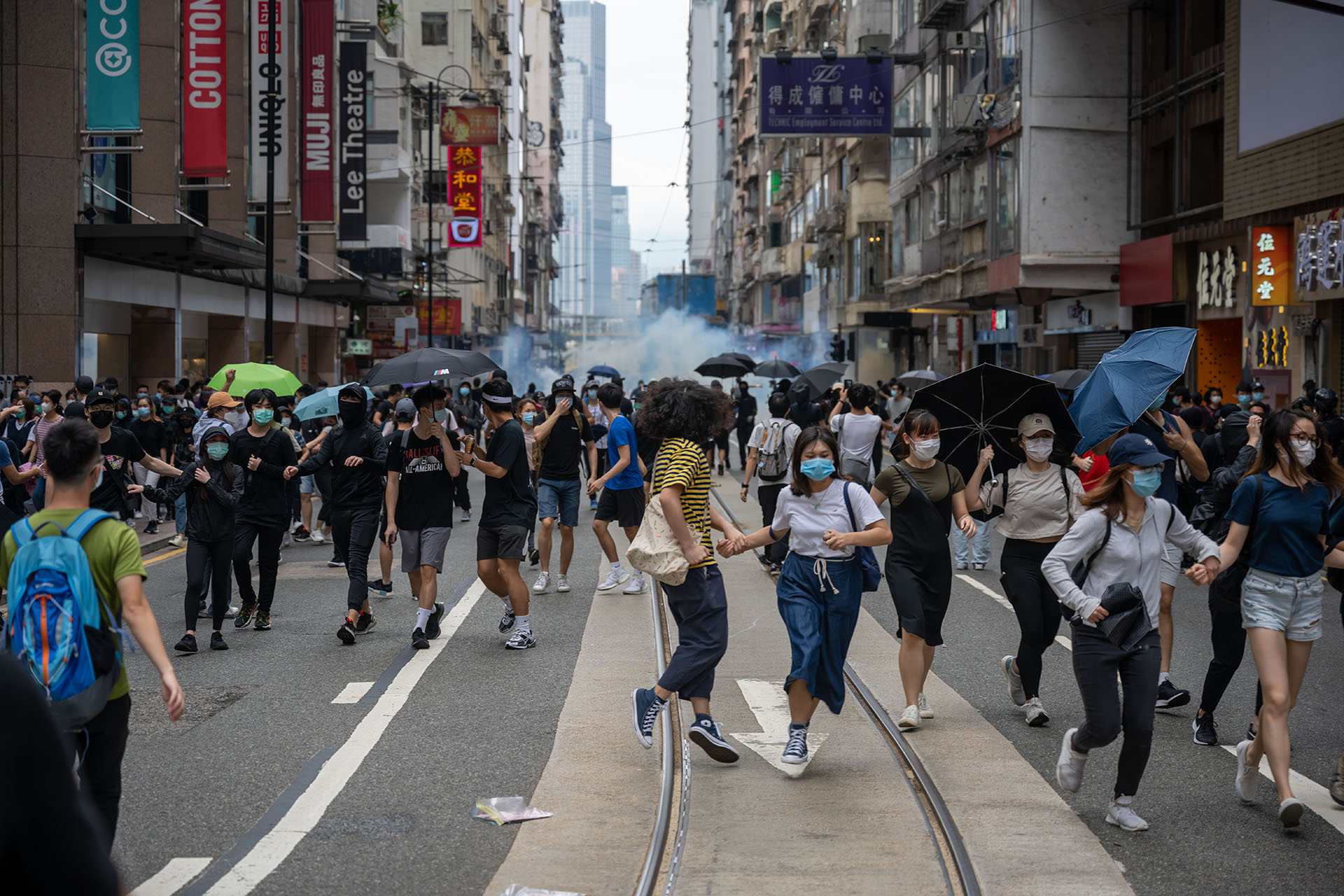
The protest garnered attention of both local and international media because it was the first public demonstration approved by the Hong Kong police since 2020. According to the Public Order Ordinance, protest organizers must inform and obtain a “no-objection notice” before mounting a public procession of more than 30 persons or a public meeting of more than 50 persons. In practice, however, this notification system has devolved into a form of censorship, granting the police the power to prohibit public demonstrations or impose arbitrary requirements.
The land reclamation protest appears to epitomize the erosion of the freedom of assembly in Hong Kong — and it is not an isolated case. In the same month, the Hong Kong Women Workers’ Association planned a Women’s Day protest but abruptly canceled the event on the eve of the scheduled rally without disclosing any reason.
Interestingly, there had been many anonymous comments on the organizer’s Facebook page beforehand, encouraging people to join the protest. Subsequently, the police said “a lot of people, including some violent groups” were planning to attend the event, and that the organizer should cancel it “after balancing the interests of all parties.” But the local media outlet Ming Pao later discovered that some of the comments had actually been made by pro-government supporters, raising further questions on whether the so-called public order risks were actually orchestrated by the government.
Mounting restrictions and requirements
For the longest time, Hong Kong was regarded as a ‘protest capital,’ with numerous peaceful protest rallies and assemblies taking place each year, showcasing the diversity and vibrancy of civil society. But since the implementation of the National Security Law in June 2020, it has become nearly impossible for Hongkongers to express their demands and grievances through public demonstrations.
Just this April, Joe Wong Ngai-yuen, former chairman of the now-defunct Hong Kong Confederation of Trade Unions, and former Confederation member Denny To Chun-ho prepared to organize a protest rally on Labor Day (1 May). They were interrogated by the police about their funding source and whether they have a connection with Hong Kong Labor Rights Monitor, an overseas advocacy group. Notably, they were also asked about how to prevent violent groups from “hijacking” the protest. Four days after being questioned, Wong was suddenly taken by the police and “disappeared” for a few hours. In a statement later, To revealed that Wong had withdrawn the protest application after apparently being subjected to enormous pressure.
Following Wong’s application withdrawal, Hong Kong Secretary for Security Chris Tang Ping-keung said, “If someone is unable to ensure the safety of any public order event or the orderly running of the event, it is a responsible act to withdraw the application.”
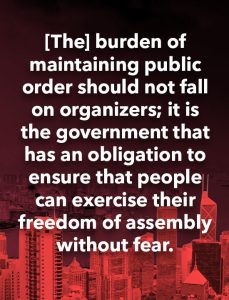 Aside from imposing rather unreasonable requirements, it seems Hong Kong authorities are now attempting to coerce protest organizers into canceling their events also by shifting the responsibility of maintaining public order onto them. And yet the burden of maintaining public order should not fall on organizers; it is the government that has an obligation to ensure that people can exercise their freedom of assembly without fear.
Aside from imposing rather unreasonable requirements, it seems Hong Kong authorities are now attempting to coerce protest organizers into canceling their events also by shifting the responsibility of maintaining public order onto them. And yet the burden of maintaining public order should not fall on organizers; it is the government that has an obligation to ensure that people can exercise their freedom of assembly without fear.
In its General Comment No. 37 on the right of peaceful assembly, the U.N. Human Rights Committee (UNHRC) stresses the duties State Parties should uphold. These include an obligation not to “prohibit, restrict, block, disperse or disrupt peaceful assemblies without compelling justification.” They are also obliged to “facilitate peaceful assemblies and to make it possible for participants to achieve their objectives.”
Besides, any restriction on protests should not be disproportionate. The strict limitation on the number of participants is clearly unreasonable and onerous as it is impossible for protest organizers to precisely predict the eventual turnout. There are no sufficient grounds to prohibit people from joining protests or to require organizers to urge them to leave just because the number of participants exceeds expectations or an imposed limit. The requirement of wearing numbered lanyards is also obviously a form of surveillance that infringes on participants’ right to privacy and serves as an attempt to deter people from joining the protest. (It can be argued as well that the numbered lanyards are rather humiliating to wear as they remind some of either prisoners or branded livestock.)
Moreover, while the government cites the need to consider the potential for violence during protests — hence all these measures — it should be noted that the UNHRC says that protesters’ anonymity “should be allowed unless their conduct presents reasonable grounds for arrest.” Accordingly, any additional requirements, including the anti-mask ban that prevents people from preserving their anonymity — while exposing them to possible health risks — are arguably inconsistent with international human rights standards.
Flowers and candles now “threats”
Unfortunately, it appears that the Hong Kong government now disregards these obligations as its behavior increasingly deviates from international human rights standards.
The recent 34th anniversary of the Tiananmen Square massacre set yet another example of how the Hong Kong government tramples on the exercise of the freedom of assembly and expression. From 1990 to 2020, Hong Kong had played a vital role in commemorating the victims of the 4 June 1989 massacre, hosting the largest candlelight vigils in the world every year. Beginning 2020, the government banned the vigils for pandemic reasons. All pandemic preventive measures have since been lifted, but public commemorations remain prohibited.
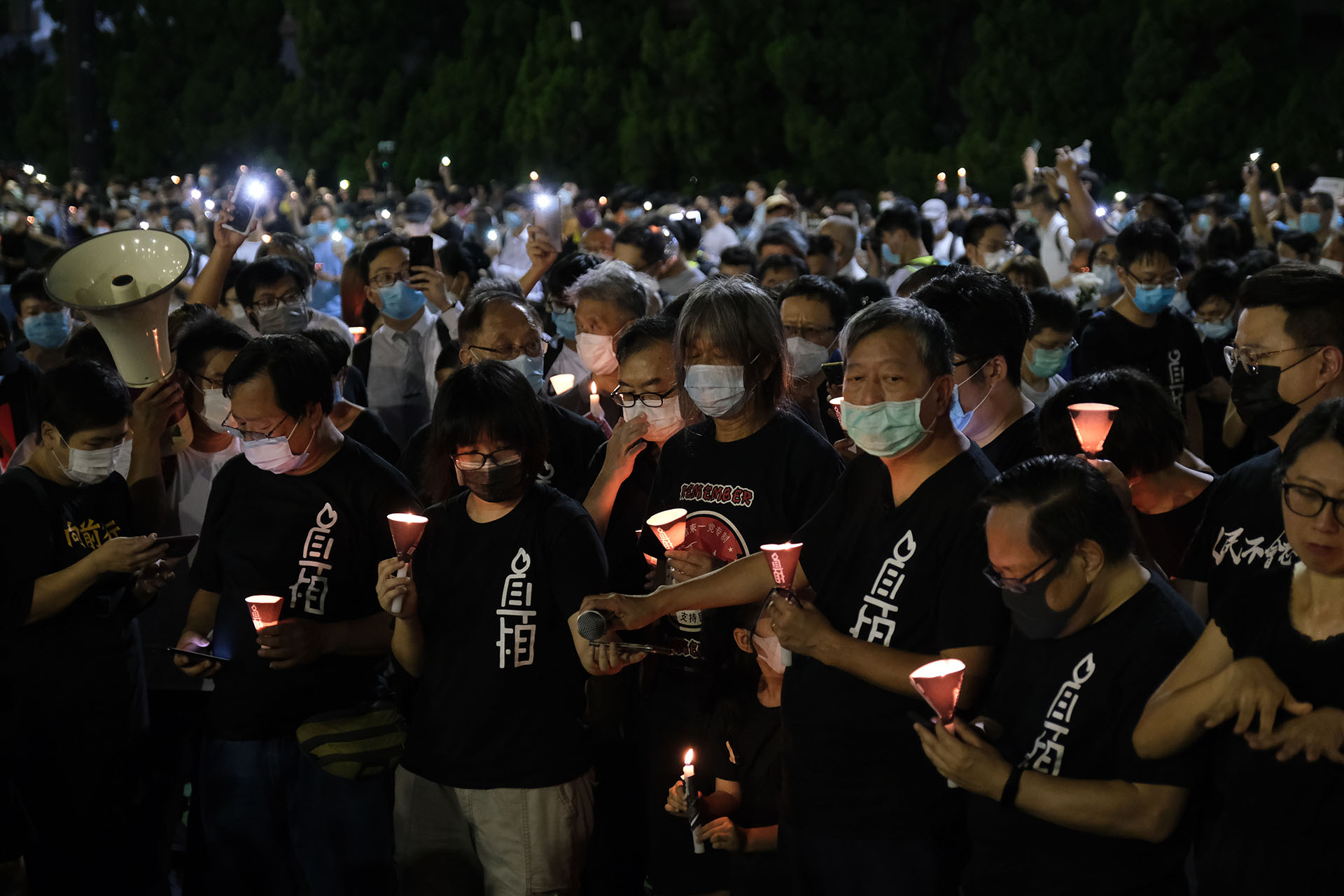
On this year’s anniversary, 6,000 police officers were deployed across Hong Kong, and individuals were stopped and searched near Victoria Park, the previous venue of the famous candlelight vigils. The park this time around was occupied by pro-government groups hosting a carnival. According to the local online news outlet The Collective, most of the 23 people taken by the police for “breaching public peace” were simply wearing black t-shirts or peacefully holding flowers or electronic candles.
It has become a common practice for Hong Kong authorities to heavily suppress any form of dissent by deploying a substantial number of police forces on special occasions, creating a disconcerting parallel to the longstanding situation in mainland China. On 1 July, the anniversary of Hong Kong’s handover from Britain to China, which had historically seen mass protests, thousands of police were mobilized; anti-riot armored vehicles stood ready on the city’s streets. According to a report by The Collective, the police that day forced an 87-year-old man who had a portrait of Jesus hanging from his neck and was clutching an A3 paper with Chinese scribbling to leave the city center via the subway. Written on the paper that the man held were demands for the repeal of the National Security Law, the fulfillment of international human rights standards, and the release of political prisoners.
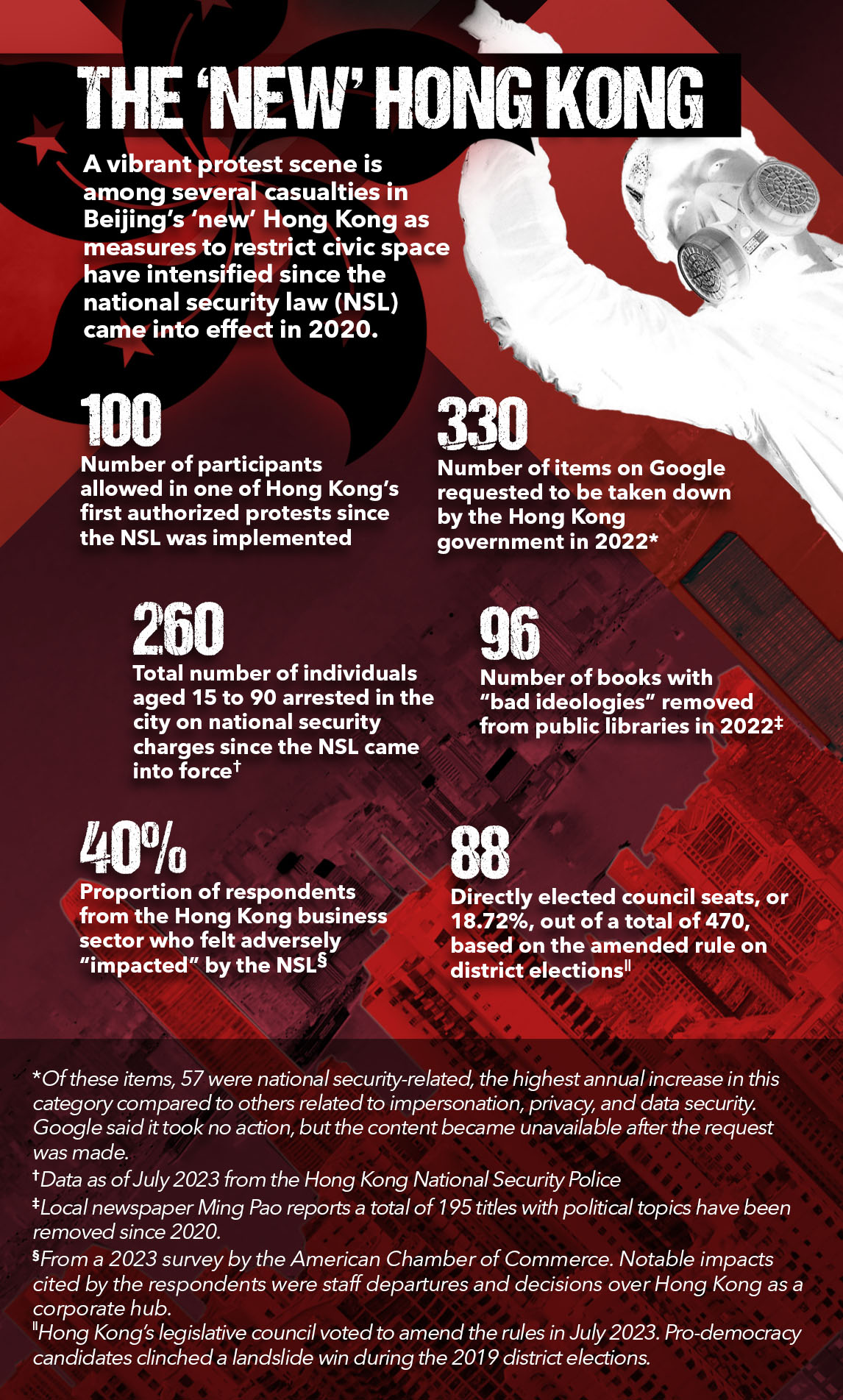
The Hong Kong government wants to show that the people of one of China’s Special Administrative Regions are greatly contented with the city’s current state of affairs. But if Hong Kong’s people genuinely feel as content and supportive of the government as the authorities want everyone to believe, then why does the government go to great lengths in imposing all kinds of requirements and restrictions for those planning protests and deploying a significant number of police officers to intimidate citizens and impede their right to speak up?
The answer to that question is undoubtedly evident. ◉










